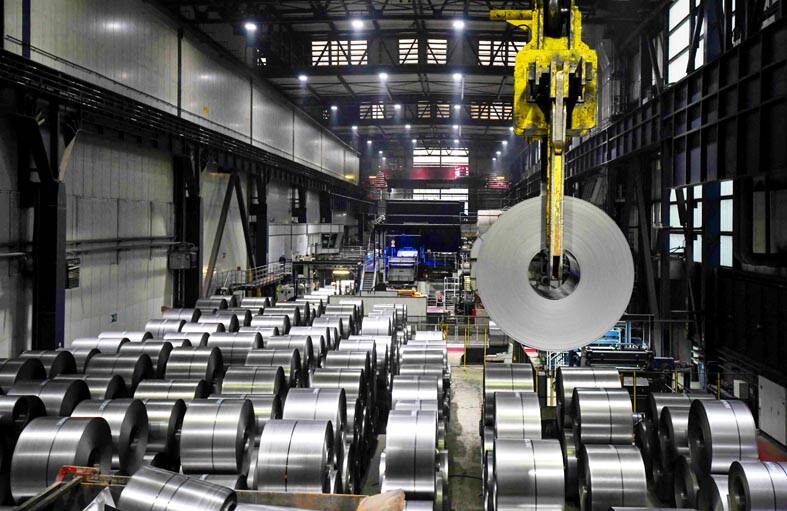The world’s biggest steel producer sounded the alarm about a crisis in China that carries the potential to send global shock waves, warning of a deeper industry downturn than major events in 2008 and 2015.
Conditions in China are like a “harsh winter” that would be “longer, colder and more difficult to endure than we expected,” China Baowu Steel Group Corp (寶武鋼鐵集團) chairman Hu Wangming (胡望明) told staff at the company’s half-year meeting.
For commodities including steel, the warning from Baowu underscores risks to demand and prices, as well as what ArcelorMittal SA, the No. 2 firm in the industry, called an “aggressive” surge of exports from China.

Photo: AFP
China’s steel market — by far the world’s largest — is flashing multiple warning signs as the protracted property downturn shows no signs of ending, while factory activity remains subdued. Baowu alone produces about 7 percent of the world’s steel, and its commentary is closely tracked to gauge the market mood in the Asian nation.
Hu’s stark message would likely be a worry for rivals across Asia, Europe and North America as they grapple with a fresh wave of Chinese exports, often by pushing for trade measures. Shipments from China are on track to reach about 100 million tonnes this year, the highest since 2016, as producers there scramble to offset a domestic slowdown.
German steel giant ThyssenKrupp AG yesterday highlighted the industry’s challenges by reporting a big slump in earnings. Earlier this month, ArcelorMittal said that China’s rising exports had put the global market in an “unsustainable” condition.
China’s steel industry experienced devastating slumps during the global financial crisis of 2008 and 2009, and again in 2015 and 2016. In both cases, the crises were ultimately resolved by massive stimulus — a prospect that looks more remote this year as Chinese President Xi Jinping (習近平) bids to reshape the economy.
Baowu did not offer much on the causes of the downturn, focusing on how employees should respond: by preserving cash and minimizing risks.
“Financial departments at all levels should pay more attention to the security of the company’s funding,” with a need to strengthen controls, including for overdue payments and detecting fake trades, the statement said.
“In the process of crossing the long and harsh winter, cash is more important than profit,” it said.

Hon Hai Precision Industry Co (鴻海精密) yesterday said that its research institute has launched its first advanced artificial intelligence (AI) large language model (LLM) using traditional Chinese, with technology assistance from Nvidia Corp. Hon Hai, also known as Foxconn Technology Group (富士康科技集團), said the LLM, FoxBrain, is expected to improve its data analysis capabilities for smart manufacturing, and electric vehicle and smart city development. An LLM is a type of AI trained on vast amounts of text data and uses deep learning techniques, particularly neural networks, to process and generate language. They are essential for building and improving AI-powered servers. Nvidia provided assistance

GREAT SUCCESS: Republican Senator Todd Young expressed surprise at Trump’s comments and said he expects the administration to keep the program running US lawmakers who helped secure billions of dollars in subsidies for domestic semiconductor manufacturing rejected US President Donald Trump’s call to revoke the 2022 CHIPS and Science Act, signaling that any repeal effort in the US Congress would fall short. US Senate Minority Leader Chuck Schumer, who negotiated the law, on Wednesday said that Trump’s demand would fail, while a top Republican proponent, US Senator Todd Young, expressed surprise at the president’s comments and said he expects the administration to keep the program running. The CHIPS Act is “essential for America leading the world in tech, leading the world in AI [artificial

DOMESTIC SUPPLY: The probe comes as Donald Trump has called for the repeal of the US$52.7 billion CHIPS and Science Act, which the US Congress passed in 2022 The Office of the US Trade Representative is to hold a hearing tomorrow into older Chinese-made “legacy” semiconductors that could heap more US tariffs on chips from China that power everyday goods from cars to washing machines to telecoms equipment. The probe, which began during former US president Joe Biden’s tenure in December last year, aims to protect US and other semiconductor producers from China’s massive state-driven buildup of domestic chip supply. A 50 percent US tariff on Chinese semiconductors began on Jan. 1. Legacy chips use older manufacturing processes introduced more than a decade ago and are often far simpler than

Gasoline and diesel prices this week are to decrease NT$0.5 and NT$1 per liter respectively as international crude prices continued to fall last week, CPC Corp, Taiwan (CPC, 台灣中油) and Formosa Petrochemical Corp (台塑石化) said yesterday. Effective today, gasoline prices at CPC and Formosa stations are to decrease to NT$29.2, NT$30.7 and NT$32.7 per liter for 92, 95 and 98-octane unleaded gasoline respectively, while premium diesel is to cost NT$27.9 per liter at CPC stations and NT$27.7 at Formosa pumps, the companies said in separate statements. Global crude oil prices dropped last week after the eight OPEC+ members said they would